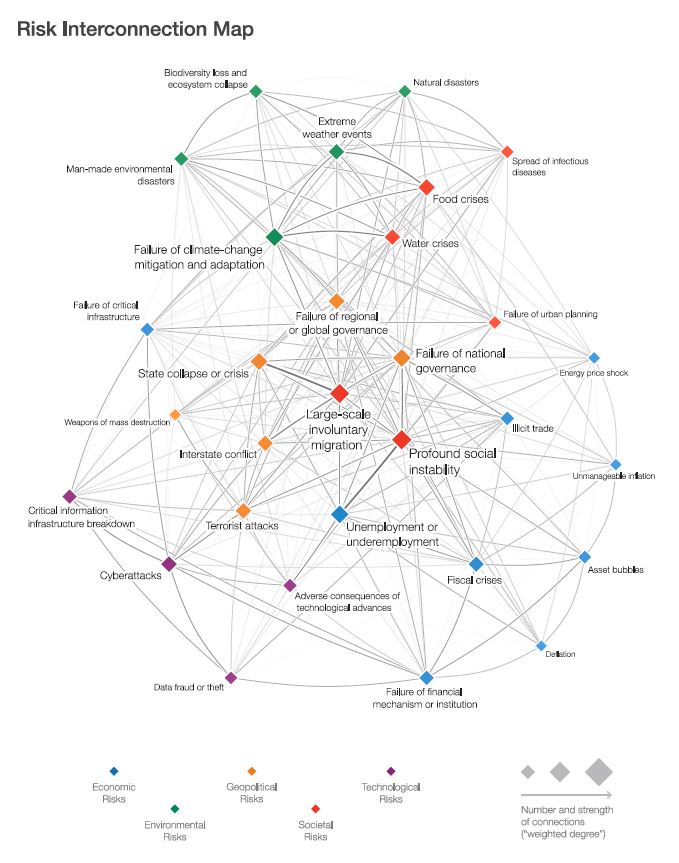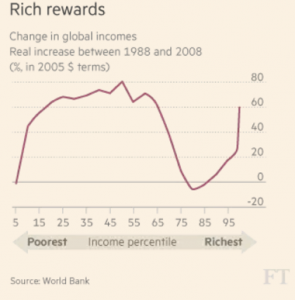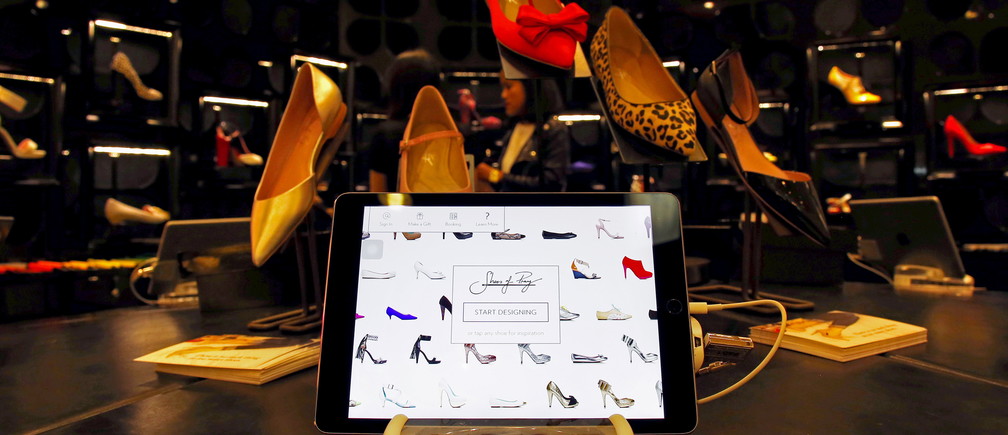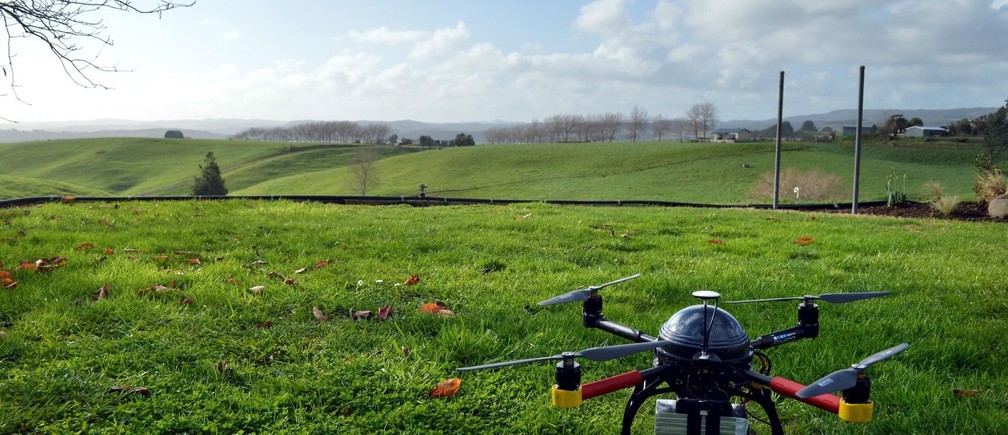The Global Challenges of the 21st Century – A post by Prof Nicolas Forsans
Once again in 2017 the World Economic Forum highlighted in its 2017 Global Risks Report the interconnections that exist between some of the most significant challenges that are shaping business and society in the 21st century. Those interconnections are represented below in their Risk Interconnection map.
 Economic and societal challenges
Economic and societal challenges
Globalisation has lifted millions of people out of poverty by enabling people in emerging countries to take part in world trade. Deregulations and privatisations have encouraged competition and innovation, leading to declining prices and higher quality products while urbanisation and industrialisation in emerging economies have enabled 3 billion people to generate an income of at least $10/day.
In addition to creating new markets for local firms, it has enabled multinationals from Europe and North America to greatly benefit from those events through global presence and increased scale. By tapping into each country’s comparative advantages they’ve greatly benefited from cheap labour and low borrowing costs, opting for scale to minimise production costs.
There is no doubt that most of the world’s population are better off as a result of globalisation, with millions of people lifted out of poverty in developing countries. But one important group is not. The one group that has lost out is around the 80th income percentile (Figure 1) – that is to say, more or less the lower– to lower middle class in the rich world.
 The societal implications of this inequality can be significant, and have only just started to emerge. They take the form of the rise of populist political parties in the West, the election of Donald Trump in the US presidential election and the growing political instability that is affecting Europe and the USA.
The societal implications of this inequality can be significant, and have only just started to emerge. They take the form of the rise of populist political parties in the West, the election of Donald Trump in the US presidential election and the growing political instability that is affecting Europe and the USA.
The populist’s supporters have a legitimate grievance: this group has been left behind by economic developments as industrial jobs have become scarcer in the West since the 1970s. Low skilled manufacturing jobs and repetitive clerical tasks have been lost to automation, and many of the benefits that had been installed in the 1960s have now been eroded, for example access to affordable mortgages, affordable education, social security and healthcare.
The recession that followed the 2008 financial crisis was one of the deepest and longest lasting downturns of the post World War II era, and the recovery that followed it has been unusually sluggish in many advanced economies. McKinsey estimates that between 65 and 70% of households in 25 advanced economies are today in segments of the income distribution whose real incomes were flat or had fallen in 2014 relative to 2005. This compares to only 2%, or 10 million households who experienced this phenomenon in the previous decade.
We have now reached a situation where luxuries (TVs, electronics) have become very cheap, but the basic things that are essential to life (food, education, healthcare) are getting increasingly expensive. How can we boost economic growth and ensure prosperity for all?
An ageing population
Population in most of the Western world and in Asia is getting older. Yet, by 2050 world population will increase to 9 billion according to the United Nations, with 50% of population growth coming from Africa and 2/3 of the middle class originating from Asia and the Pacific.
Fewer working age people means less human resource available to ‘produce’. Therefore with a growing world population, only productivity gains will enable us to produce more with less. Climate change & resource scarcity
Climate change & resource scarcity
In the past four decades economies and businesses have benefited from cheaper and better quality imports and improvements in efficiencies in production. And during that period, economic growth has come from scale, i.e. producing and selling high volumes of products to minimise production cost. This has come with a huge price tag: in the past 50 years, 60% of the earth’s ecosystem has been depleted, as reported by the World Economic Forum and natural-resource consumption is expected to rise by three to six times by 2050. The United Nations estimates that demand for water will exceed supply by 40%, and water shortages could affect half the world’s population. Climate change and extreme weather events will have significant economic costs, disrupting supply chains and the security of supply, and impacting primarily countries and regions that are among the poorest in the world, which is likely to exacerbate conflicts.
 With the world population expected to increase to 9 billion and the size of the global middle class to triple, how long can we sustain this development model without further damaging the environment and aggravating existing inequalities? New business models and a paradigm shift are needed if we want to promote prosperity for all in a severally constrained world.
With the world population expected to increase to 9 billion and the size of the global middle class to triple, how long can we sustain this development model without further damaging the environment and aggravating existing inequalities? New business models and a paradigm shift are needed if we want to promote prosperity for all in a severally constrained world.
The fourth industrial revolution is digital
While flows of physical goods and finance were the hallmarks of globalisation in the 20th century, today those flows have declined or flattened as less importance is being placed on labour costs and more on non-labour costs and speed to market. As a result, some production is moving closer to the end consumer and global value chains are shortening. In the 21st century, globalisation is being defined by flows of data and information. The volume of data being transmitted across borders has surged, creating an intricate web that connects countries, companies and individuals. Today, we are talking about emails, videos, music, movies, voice, but by 2019 it is estimated that 40% of all connections will be machine-to-machine.
Billions of people around the world are connected by mobile devices with unprecedented processing power, storage capacity and access to knowledge and information, anytime and anywhere. The opportunities they generate are multiplied by emerging technology breakthroughs in the fields of artificial intelligence, robotics, the Internet of Things, 3D printing, nanotechnology etc. Artificial Intelligence is already around us – from self-driving cars to drones and virtual assistants pioneered by Amazon, Google and Apple. This revolution is characterised by a fusion of technologies that is blurring the lines between the physical and the digital spheres. This is what is often referred to as the fourth industrial revolution – a revolution that will fundamentally alter the way we live, interact with one another, consume and work. While we can’t appreciate its full impact yet, we know that its scale, scope and complexity will be unlike anything we have experienced before. As digital platforms become global in scope they are driving down the costs of cross-border communications and transactions, reducing the minimum scale needed to operate on a global scale, enabling small businesses and entrepreneurs around the world to participate. New business models championed by new types of competitors are emerging, forcing incumbents to adapt. To-date, those who have gained most are consumers able to afford and access the digital world, enabling them to order a cab, book a flight, buy a product, make a payment, listen to music etc. Yet those digital platforms and technologies are also producing threats, taking jobs away from humans. They are giving rise to a new type of economy – the “gig economy”, creating opportunities for some but insecurity of employment for others.
As digital platforms become global in scope they are driving down the costs of cross-border communications and transactions, reducing the minimum scale needed to operate on a global scale, enabling small businesses and entrepreneurs around the world to participate. New business models championed by new types of competitors are emerging, forcing incumbents to adapt. To-date, those who have gained most are consumers able to afford and access the digital world, enabling them to order a cab, book a flight, buy a product, make a payment, listen to music etc. Yet those digital platforms and technologies are also producing threats, taking jobs away from humans. They are giving rise to a new type of economy – the “gig economy”, creating opportunities for some but insecurity of employment for others.
So while the fourth industrial revolution has the potential to raise global income levels and improve the quality of life for populations around the world, it also forces us to rethink the way individuals and organisations operate.
A two part post by Prof Nicolas Forsans and Jackie Bagnall
Business and society are facing unprecedented challenges that will shape the 21st Century. Economic, societal, environmental and technological challenges are impacting business and with this complexity the expectations placed onto aspiring leaders are changing.
In this two-part series Professor Nicolas Forsans, Director One Planet MBA programmes and Jackie Bagnall, Senior Lecturer in Organisational Studies and Leadership highlight the significance of those challenges, their implications for leadership and on business models and strategies to thrive in a complex world.
http://business-school.exeter.ac.uk/study/masters/opmba/about/about_mba/
